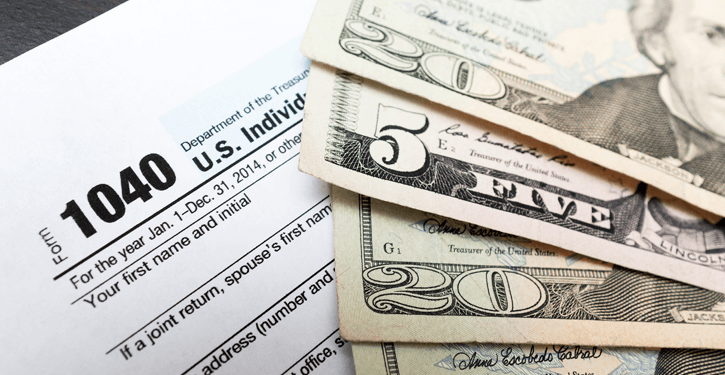Student loan debt is a well-known issue in the United States. The soaring cost of tuition and issues with income-driven repayment plans have left many borrowers between a rock and a hard place. We might see some light at the end of the tunnel.
Several bills currently before Congress could significantly alleviate many of the issues borrowers face. Three big problems could be addressed if the proposed bills eventually become law:
- Forgiven student loans are currently taxable
- Extra payments are applied to interest first
- The high interest rates on some older student loans can’t be lowered while retaining the flexible repayment options
Problem #1: Forgiven student loan debt is taxable income
Income-driven repayment plans help borrowers with everyday cash flow, but any amount forgiven at the end of repayment period is taxable income. That means that even after making payments for 20-25 years, you could face a totally new bill to pay, this time to Uncle Sam.
The proposed change
Several bills before both the House and Senate would amend the IRS code to exclude the discharge of student loan debt from taxable income, eliminating the final gotcha on the forgiven amount at the end of an income-driven repayment term.
How the change will help the average borrower
Currently, the average college graduate has approximately $30,100 in student loan debt. According to the National Association of Colleges and Employers, the average starting salary for a college graduate is $50,556. If you have the average amount of debt and income, then this proposed change will not impact you because you are likely to repay your debt within the 20-25 year repayment term.
For those who see a big difference between what they owe and the amount of income they make, this proposed change could result in tens of thousands of dollars in savings.
For example, in Birmingham, AL the average student loan balance per person is $60,184 while the average earnings are $39,868. If a borrower saw no increase in salary, the forgiven amount could result in a tax bill of $20,000-$30,000 dollars. The proposed bill would wipe that out.
Keep in mind that there is no way to predict your probable tax bill 20 or 25 years in the future. The amount of student loan debt you pay back between now and then, whether you remain eligible for an IBR plan for the entire time, and the tax bracket you fall into when the repayment period ends are all factors that affect the final balance and any tax consequences.
Problem #2: Extra payments are applied to interest first
When borrowers make an effort to get ahead on their student loans and pay them down more quickly, some are thwarted by the fact that extra payments are applied to accrued interest first. That means that the extra payment, above and beyond the minimum due, might not bring the principal balance down at all. The law allows lenders to apply your payments this way, and it is in their financial interests to do so. What it means for you is that your principal loan balance stubbornly stays put and you don’t make much headway against it.
The proposed change
A bill before the House of Representatives would require prepayments (payments above the minimum payment amount) to be applied first towards any outstanding fees and then to the “principle due on the loan with the highest interest rate.”
Since interest is calculated based on the outstanding principle, having extra payments applied towards the principle first results in less interest accruing overall.
How the change will help the average borrower
Interest is what traps borrowers in longstanding debt. It’s possible to make payments for years, or even decades, and not make any progress on your loan. This is especially true on an income-based repayment plan because it is possible to have a required payment that is less than the amount of interest that accrues.
The only way to pay off debt is to reduce the principal balance over time. Applying extra payments to the principal balance creates an opportunity to reduce the amount of interest owed and the total amount of debt.
Problem #3: Borrowers are stuck with high-interest rates on older federal student loans
If you have a federal student loan, then you have access to several flexible repayment plans including income-based repayment plans. You can consolidate your loans into a Federal Direct Consolidation loan, and your interest rate will be the average of your previous interest rates. This may or may not offer a financial advantage.
If you have a mortgage and rates go down, you can refinance your loan to the lower interest rate. If you have student loans and the rates go down, you cannot refinance them to a lower interest rate unless you refinance with a private lender. Private lenders do not offer income-based repayment plans, extended repayment options or loan forgiveness. Borrowers who opt for private loans, to refinance at a lower rate or for any other reason, give up all of those benefits.
The proposed change
Two proposed bills would address consolidating and refinancing federal student loans. The first bill would allow borrowers to consolidate their federal student loans as part of a Federal Direct Consolidation Loan at an interest rate of 4% or less if the weighted average of the loans would be less than 4%.
The second bill would allow borrowers to refinance federal student loans through the government to the current interest rate available, enabling borrowers to continue to have access to flexible repayment plans.
How the change will help the average borrower
The average interest rate on federal loans for the last eight years is 6.5%. A borrower who consolidated $30,100 of student loan debt at this rate would pay $10,913.54 in interest under the standard repayment plan. If rates fall to 4% and this borrower can refinance at that rate, he or she will pay just $6,469.68 in interest, for a savings of nearly $4,500.
We will have to wait and see what solutions Congress decides to pass into law. It will also be interesting to see what the President-elect will try to accomplish in regards to student loan debt. As someone with significant student loan debt, I hope that all three of these proposed bills will eventually become law.























